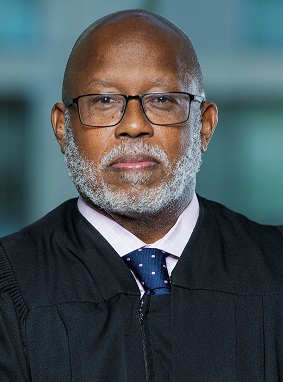
The Honorable Milton C. Lee Jr. was nominated by President Barack Obama to be an Associate Judge of the Superior Court of the District of Columbia on January 20, 2010. His nomination was confirmed by the United States Senate on June 22, 2010. On July 26, 2024, the District of Columbia Judicial Nominations Commission designated Judge Lee as Chief Judge of the Superior Court. Judge Lee began his four-year term as Chief Judge of the Court on October 1, 2024.
Judge Lee is a native of the District of Columbia. He received his Bachelor of Arts from the American University School of Justice in 1982. He obtained his Juris Doctor from the Catholic University of America’s Columbus School of Law in 1985.
Following law school, Judge Lee joined the District of Columbia Public Defender Service as a staff attorney. There he served as a trial attorney for many years, representing indigent persons in the Family, Misdemeanor, and Felony Divisions of the Superior Court where he tried over 70 cases to a jury. He also argued a number of appellate cases before the District of Columbia Court of Appeals.
Judge Lee took leave from the Public Defender Service in 1990 to join the faculty at the Georgetown University School of Law where he served as a Visiting Associate Professor of Law in the Criminal Justice Clinic. He also served as a supervisor in the E. Barrett Prettyman Program. He returned briefly to the Public Defender Service as Deputy Trial Chief where he had oversight of the daily operations of the trial division. In 1993, Judge Lee joined the faculty at the former District of Columbia School of Law, where he supervised students in the Juvenile Law Clinic. Judge Lee transitioned his academic focus to the classroom teaching Evidence, Criminal Law and Procedure, Advanced Criminal Procedure, Trial Advocacy, and Wills and Estates. In addition to being a member of the adjunct facility at the David A. Clarke School of Law, in 2011 Judge Lee joined the adjunct faculty at the Howard University School of Law. As a law professor, Judge Lee published articles on topics such as juvenile detention, criminal discovery and special education law.
Judge Lee joined the District of Columbia Superior Court as a magistrate judge in November 1998. Since his appointment to the Court, Judge Lee has served in the Criminal, Civil and Domestic Violence Divisions as well as the Family Court. He served as the presiding magistrate judge from 2006 until his nomination.
From 2008 to 2013, Judge Lee spearheaded the development of Superior Court’s Fathering Court Initiative. The Initiative represents a partnership between the court, several governmental agencies and the private sector directed toward creating opportunities for non-custodial parents to become meaningful contributors to the development of their children. The initiative has worked with many reentry parents by providing employment, educational training, parenting training and support groups as well as wrap around services for the entire family. The Fathering Court Initiative has garnered national recognition for its innovative problem-solving approach to reuniting families. In 2012, as the presiding judge of the Fathering Court Initiative, Judge Lee authored “Fatherhood in the Child Support System: An Innovative Problem-Solving Approach to an Old Problem” and “Fathering Court: A New Model for Child Support Enforcement."
In 2016, Judge Lee was appointed to the District of Columbia Sentencing Commission and served as the Chair from 2018 until his appointment as chief judge. The mission of the Sentencing Commission is to implement, monitor, and support the District’s Voluntary Sentencing Guidelines, to promote fair and consistent sentencing policies, to increase public understanding of sentencing policies and practices and to evaluate the effectiveness of the guideline system. As chair, the Commission refocused its commitment on community engagement to ensure greater access to information regarding the Commission’s activities and during this period achieved some of its highest guideline compliance.

 Share
Share